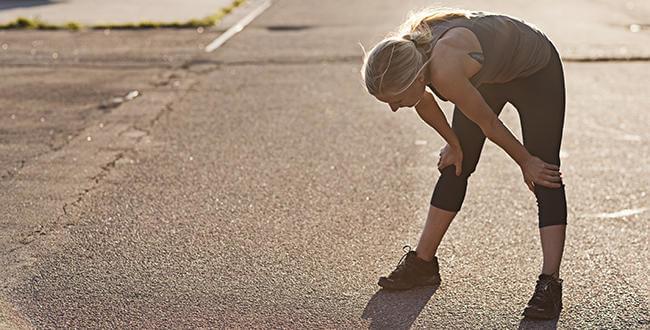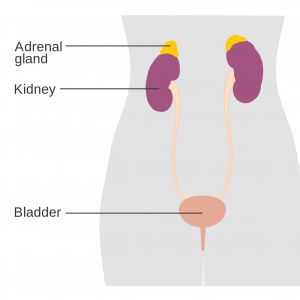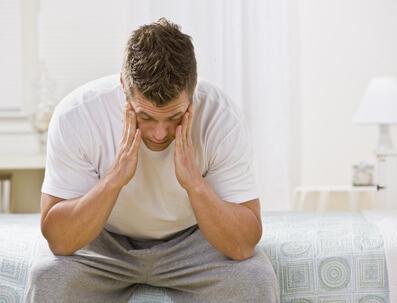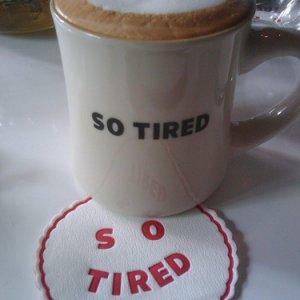Running with Adrenal Fatigue: Treatment & Prevention

The body’s “fight or flight” response is a complex combination of reactions all over the system that aim to boost energy in anticipation of fighting or running. Within moments of a mentally perceived stimulus, the body increases blood flow to the extremities which diverts it from your internal organs. Digestion slows down. Muscle tension increases. Blood pressure, blood sugar, and heart rate all elevate to prepare the body with a boost of energy. A number of chemicals are released, and the body ramps up production of a hormone called cortisol.
This response could potentially improve your immediate performance, depending on the length of the race, which is why a certain amount of starting line nerves can sometimes be beneficial. However, if this process occurs chronically over time, it can be detrimental to the function of your immune system, your recovery time, and race performance.

From an evolutionary perspective, the human body was not designed to be in constant fight or flight mode. Some estimate that in cave dweller times, a person would experience a fight or flight situation once or twice a year. In our culture and time, many people experience this phenomenon all day long as they repeatedly have an over-reaction to both psychological and physical triggers. As a result, particularly in fast-paced westernized cultures, there have been more and more cases of adrenal fatigue or adrenal burn-out.
Adrenal fatigue is attributed to intense or prolonged (physical or mental) stress. After a period of excess stress, the adrenal glands may function at a lower level than normal, often resulting in chronic fatigue, difficulty getting out of bed, severe grogginess in the morning, and difficulty with memory and focus. (Of course, a number of other conditions can cause these symptoms too).
More and more runners in my social network are developing adrenal fatigue into their late 20’s and 30’s. It is a serious concern for avid runners/athletes. And, it’s a bit controversial as many doctors in the US don’t acknowledge the condition and it’s tough to get a “diagnosis.”

Common Signs of Adrenal Fatigue
-you feel excessively tired and have difficulty getting up in the morning, even after 8-10 hours of sleep
-you get more energized in the evening after 6pm
-you crave salty foods
-your immune system is weak (you get sick often)
-you have a poor tolerance to stress
-you feel dizzy when you stand up
-you have difficulty with memory and concentration
-you feel like the same running workouts or mileage that you used to do are now excessively taxing
How do I test for Adrenal Fatigue?
- Cortisol tests
- Thyroid tests
- Additional tests often ordered by naturopath
- Other tests in clinic (looking at pupil contraction or postural blood pressure)
See this article for more information about testing: https://adrenalfatiguesolution.com/testing-for-adrenal-fatigue/

How do I treat Adrenal Fatigue?
Supplements are out there advertising the cure for adrenal fatigue, but exercise caution. The best solution is to work with a naturopath or functional medicine doctor to ensure accurate diagnosis and effective supplementation, if needed. Many people with adrenal fatigue have underlying vitamin or mineral deficiencies and need further testing before beginning supplements.
Most specialists agree that lifestyle changes are the most effective way to heal your system. For runners, this means taking a very serious look at the following:
- Your training plan. Are you over-training? Do you need to drop your mileage and/or add gentle cross training substitutions? Are you sacrificing too much sleep in order to train?
- The “Big Picture” for running. Perhaps your body is telling you to slow down. Maybe you need to take a “gap year” from racing to allow full healing. Most agree that regular light exercise is important to maintain with this condition, but the higher intensity and higher duration sessions can further contribute to adrenal burn-out.
- Are you incorporating yoga into your routine? (Certain yoga poses can be beneficial for reducing symptoms of adrenal fatigue. Yoga is also a great tool for runners for many other reasons).
- What is your sleep schedule like? People with adrenal fatigue do best when they go to bed by 10:30pm (at 11:00, you get a “second wind” physiologically if you’re still awake). 8-10 hours of sleep should be mandatory.
- Your screen time. Use of computer, phones, tablets or televisions can often prevent your melatonin levels from rising at night, which can make it difficult to fall asleep. Consider setting an 8pm alarm as a cut-off time.

RunnerClick - Your caffeine intake. Coffee, chocolate and caffeine-containing beverages are stimulants. Even if they are consumed early in the day, they can affect you negatively the following night and morning.
- Your meal timing. Experts recommend that you never skip breakfast and eat it before 10am. An early lunch is better, and a small snack between 2-3pm can help you through the cortisol level drop that usually occurs between 3-4pm. Having dinner by 6pm is also recommended.

- Your diet. The gut is our “second brain” and its balance is very complex. Most people need to make drastic changes to their nutritional balance in order to have full adrenal healing. There are many eating plans out there, but one that emphasizes natural foods free of processing, sugar, grains and preservatives is best. A paleo-style diet that focuses on meat, fruits and vegetables should include attention to detail. High quality proteins such as grass-fed organic meat sources are best. Increase your vegetable intake and stick to certain fruits in moderation as your sole “sugar” source.
More tips on diet can be found here: https://adrenalfatiguesolution.com/adrenal-fatigue-diet/
- Your mental health. Are you stressed all the time? Consider talk therapy, journaling, meditation exercises, and extra effort to watch things that make you laugh.
- Zoom out and take a look at your overall schedule and commitments. Do you have too much on your plate? Is there something that repeatedly stresses you out? The less you induce fight or flight responses throughout the day, the better.
When it comes to your health, less is more in many ways, and less income may be worth it if your career or race schedule is pushing you over the edge. Remember, we only get one body…
Latest Articles
 Is Running on a Treadmill Easier Than Running Outside?Runners have their own preferences, whether it is treadmill running, running outside on the road, or exploring trails. So...
Is Running on a Treadmill Easier Than Running Outside?Runners have their own preferences, whether it is treadmill running, running outside on the road, or exploring trails. So... Is It OK to Use Trail Running Shoes on the Road?While trail running shoes can be used on roads, especially in situations where a runner encounters mixed terrains or pref...
Is It OK to Use Trail Running Shoes on the Road?While trail running shoes can be used on roads, especially in situations where a runner encounters mixed terrains or pref... How to Fix Sore Quads After Running?Rest, ice, gentle stretching, and over-the-counter pain relievers can help soothe sore quads after running. Also, ensure ...
How to Fix Sore Quads After Running?Rest, ice, gentle stretching, and over-the-counter pain relievers can help soothe sore quads after running. Also, ensure ... 10 Fruits With The Most Electrolytes to Replace Sports DrinksThese fruits are high in electrolytes such as potassium, magnesium, and calcium, essential for hydration, muscle function...
10 Fruits With The Most Electrolytes to Replace Sports DrinksThese fruits are high in electrolytes such as potassium, magnesium, and calcium, essential for hydration, muscle function...

